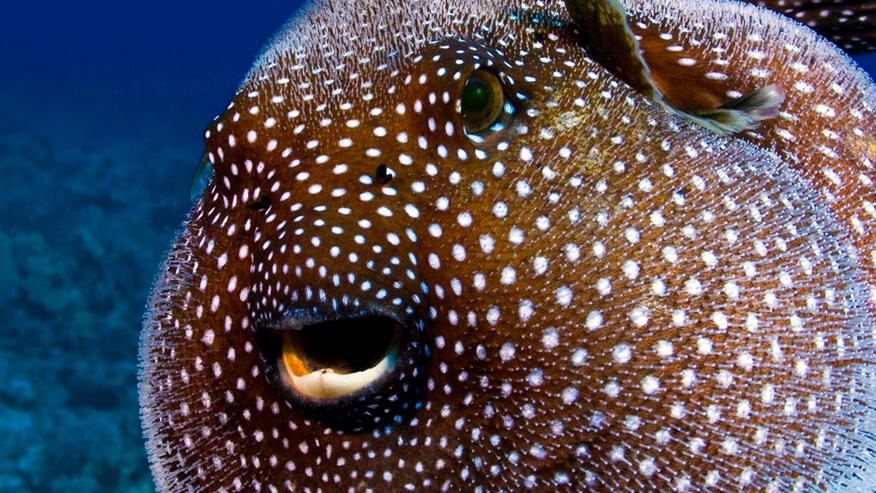A Heavy Guest came on the Mediterranean Sea from 10 years ago. The Sea that is known by its rich fishery fortune, faced a new type of fish, termed the “fish Al naffakha” Puffer fish because it breathed her throat whenever it felt the danger. But the problem is that this kind not only defends himself through the swelling, but also, viciously attack each organism encounters. A hostile Fish This Fish become a nightmare for fishermen in Lebanon. After it entered from the Red Sea to the Mediterranean, in which it proliferated in a super-fast volume, why not, if it bleach 4 to 5 thousands of fish at once! Captain ‘’Mohammed Sarji’’, a professional divers considered this fish as the most aggressive among all the fish in the Mediterranean and confirm that it has double harm that affects fish and human at the same time. On the one hand , it has a strong jaw that spend immediately on its prey, and rip the fishing nets, on the other hand, this fish has centimeters of ‘’tetrodotoxin’’ which is more dangerous than arsenic.‘’sarji’’ expresses his fear on fisheries in the Mediterranean Sea formed from thousands of years ago that from this “exotic” fish that may lead to the extinction of some species that are unable to defend themselves. For example, the famous fish ‘’Sultan Ibrahim’’, is among the top price on the Lebanese table, die by one bite one from the puffer fish. On the other hand, ‘’Sarji’’ remembers the number of cases of death and coma due to the feet of some people on cooking and eating the puffer fish without their knowledge that it is toxic, in ‘’Sidon’’ and ‘’Awzaa’I’’ and other cities near the sea. But it rest assured that the environmental associations have awareness campaigns to disseminate beware the puffer fish. “Know your enemy” The Lebanese hunters know very well this fish. This fish captured the small and slow-moving fishes, which are a favorite for hunters, and crept into the fishing yields and ate all the fishes. ‘’Sarji’’ tells how this fish captured a blower divers and bite hard in his shoulder after he approached to her under the water, and then headed towards the cage in his possession and devoured all of the fish. In his turn the fisherman ‘’Khalil Taha’’, the son of the city of Tyre, said this fish harmful caused considerable material losses for fishermen who have been forced to disable their work and change their nets repeatedly because of torn. “Only the divine power can help us to get rid from this fish,” Taha’’ says, but ads that each organism in the sea has its natural enemy that may spend it. The problem is that no one knows who is this enemy in the absence of adequate scientific studies. These Studies allowed the Japanese, for example, the discovery of the poison reservoirs in the body of the puffer fish and removed it, in preparation for cooking it at the hands of specialists, and presented in a luxurious dish. “From where was this calamity?” The Question reported by fishermen in a decade: from Where we’ve got this calamity? But the question may remain on hold, as it is difficult to say for sure in determining where it came from, ‘’Sarji’’ shows that fish often come to us in the seasons of immigration, from the ocean through the waterways, such as the Strait of Gibraltar or the Red Sea. But we have also an incredible novel informal, which says that the Israeli entity was rearing this kind of fish in private farms, to export it to a number of importing countries and especially Japan. However, Japan was able to achieve a self-sufficiency over the past decade and suspended the importation, and this is why the Israelis opened the cages in which the fish are raised and released it into the sea. Some believe that the novel is not accurate because “Lebanon and Palestine Sea is one” and it is not in the interest of the Israeli occupation authorities to launch harmless fish in its waters. While others believe that the tsunami in Japan, which abound the puffer fish in sea led to the migration across the sea until it reached us. Whatever the case, it seems that the waters of the Mediterranean seem is appropriate for the puffer fish, which is looking for a relatively warm and slow flow of water (whether fresh or salty). In the absence of any natural enemy that prevents its reproduction from the sea, the fishermen and divers and the Ministry of Agriculture calls for conducting the necessary studies to discover the ways to combat this aggressive fish to preserve what remains from our Fisheries. http://www.youtube.com/watch?v=zwxdyRyROY4











